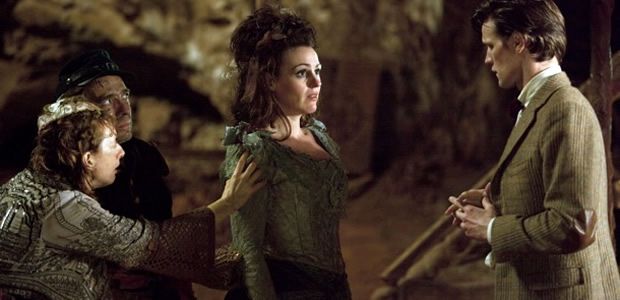Short of an episode being written by Alan Moore (or, perhaps, Stephen King), this week's Doctor Who -- written by none other than Neil Gaiman -- may be the only time where the writer of the episode outshines the eponymous hero. But that doesn't mean we don't have some questions about it. Five of them, in fact ...
What Is The TARDIS?
So, now we know for sure that the TARDIS is alive -- and, when inserted into a human body, surprisingly similar to Delirium from Gaiman's Sandman comics -- but, beyond that... What is the TARDIS? Something with a soul and a mind of its own, we can say for sure, but also something that claims to exist at all points of space and time simultaneously, according to this episode. Which makes sense, because how else can it travel around time and space safely? But that also means it knows how all of the stories end, because it's there at the same time as the stories are beginning. We've learned that the TARDIS "borrowed" the Doctor, back when he thought he was stealing the TARDIS, and we also know that she love him ... so why would she take him to somewhere where he'd die, back in "The Impossible Astronaut"? Unless, of course, she knows that he doesn't stay dead ...
(Also worth remembering: The Doctor we watched die didn't have a TARDIS that we saw. Is that a sign, somehow? And if so, what does it mean?)
And, while we're thinking about the opening story from this season ...
Is The Little Girl From "Day Of The Moon" A TARDIS?
The energy we saw her release from her hands ... The TARDIS did the same thing, this week. What if she is Amy's daughter, but the TARDIS is somehow the father? Instead of being a new Time Lord, the little girl is somehow part-TARDIS ... Is that as ridiculous as it sounds?
Are There Other Time Lords Alive After All?
The Doctor seemed surprisingly willing to believe that some Time Lords may have survived the destruction of the race by being outside the universe ... Just because he didn't find any in the Cosmic Junkyard, that doesn't necessarily mean he wasn't right. If, as we know, a TARDIS can leave the universe, how likely would it be that at least one other Time Lord thought to escape genocide by that method?
Is This The Death Season? Or Just The Opposite?
Four episodes into this season, and we've seen both the Doctor and the TARDIS "die," as well as the imaginary corpse of Rory. And, despite that, we've been given multiple hints of the Doctor not being the last Time Lord after all, and also had each death followed by the re-appearance of the person we've just seen die. If there's a theme so far from what we've seen, it just might be that death isn't necessarily the end that we tend to think it is -- fitting for a show where regeneration is always a possibility. This week, we had the Doctor admit that he's looking for redemption for his role in the death of his people ... What if he finds it by bringing the race back from extinction?
The TARDIS Told Rory "The Only Water In The Forest Is A River." So What Does That Mean?
I'll admit, I was disappointed that an episode called "The Doctor's Wife" wasn't about the one character we all suspect is the Doctor's wife ... But then we had this line thrown in at the end to tease us. It's clearly a reference to Dr. River Song, but should we put take it to mean that there's a forest in the future that River should enter, but Amy (who is, of course, a Pond, another body of water) shouldn't? I'm convinced it's an Amy/River clue of some sorts; I just don't know what kind. Yet.

